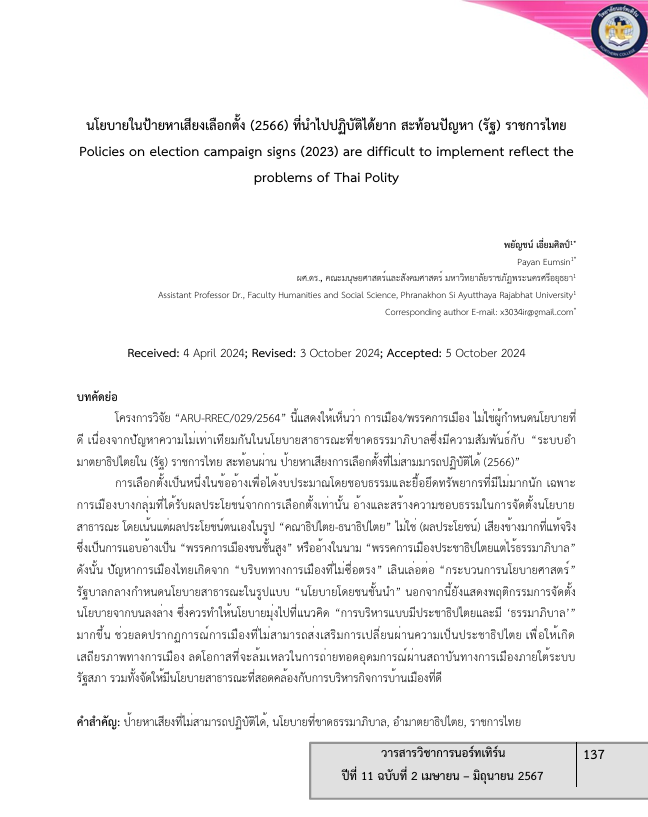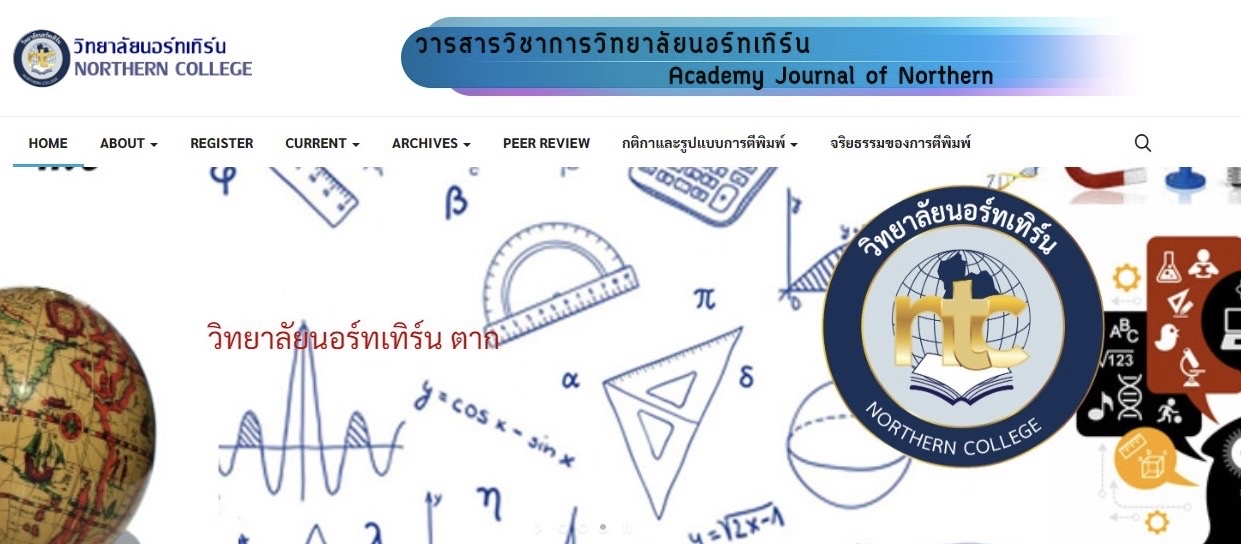นโยบายในป้ายหาเสียงเลือกตั้ง (2566) ที่นำไปปฏิบัติได้ยาก สะท้อนปัญหา (รัฐ) ราชการไทย
Keywords:
Unpractical election-campaign, Un-governance policy, Thai Polity, Thai BureaucracyAbstract
This “ARU-RREC/029/2564 research” project showed that political (parties) were not the good policy makers. Because of inequality problems and good governance public policy in relationship between “’the system of bureaucracy in Thai Polity and government service’ Reflected on Un-practical Election Billboards (2023)”.
Where an election was one among the claims to righteously obtain the budgets and to hold back (poor) Thai resources. Only certain political groups that obtained benefits from the election. They tended to claim and create the righteousness on public policy establishment, where the focus was only on their own benefits in form of “Oligarchy-Plutocracy”. Thai political problems stemmed from the “mismatch of political context” and negligence over the “policy-science process”. The central government established Thai public policy in form of “Elite model policy”. In addition, Top-down policy establishment behaviours had even enabled the needs to focus more on the idea of “democracy administration and ‘Good Governance’”, reducing political phenomenon that could not transform into Western democracy to obtain political stability. It failed to transfer ideology through the political institutes under parliamentary system as well as providing public policy in correspond with good administration.
References
Aberbach, J. D. (1981). Bureaucrats and Politicians in Western Democracies. Cambridge: Harvard University Press.
Bevir, M. (2010). Democratic Governance. Princeton: Princeton University Press.
Bovaird, T. & Loeffler, E. “Understand public management and governance,” in Bovaird, T. & Loeffler, E. (Edited). (2016). Public Management and Governance (Third Edition). London and New York: Routledge Taylor & Francis Group.
Bray, D. & Slaughter, S. (2015). Global Democratic Theory: A Critical Introduction. Cambridge: Polity Press.
Brown, A. (2004). Labour, Politics and the State in Industrializing Thailand. London: Routledge Curzon.
Burger, T. (1976). Max Weber’s Theory of Concept Formation: history, Laws, and Ideal Types. Durham, North Carolina: Duke University Press.
Chaianan S. (2005). 100 Years of civil service reform: The evolution of state power and political power. Bangkok: Sukhum and Sons Company Limited.
Chambers, P. & Waitoolkiat, N. (2016). The Resilience of Monarchised Military in Thailand. Journal of Contemporary Asia, (VOL. 46, NO. 3).
Chandler, J. A. (2017). Public Policy and Private Interest: Ideas, Self-Interest and Ethics in Public Policy. Abingdon, Oxon: Routledge.
Crozier, M. (1964). The Bureaucratic Phenomenon. Chicago: The University of Chicago Press.
Davis, H. & Piotrowski, S. J. “Ethics and standard of conduct,” in Bovaird, T. & Loeffler, E. (Edited). (2016). Public Management and Governance (Third Edition). London and New York: Routledge Taylor & Francis Group.
Easton, D. (1957, Apr). An Approach to the Analysis of Political Systems. World Politics, (Vol. 9, No. 3).
Ezrow, N. & Frantz, E. (2011). Dictators and dictatorships: Understanding Authoritarian Regimes and their Leaders. New York: The Continuum International Publishing Group.
Fry, B. R. & Raadschelders, J. C. N. (2014). Mastering public administration: From Max Weber to Dwight Waldo (3rd ed.). Thousand Oaks, CA: SAGE.
Gould, D. J. (1980). Bureaucratic corruption and Underdevelopment in the Third World: The Case of Zaire. New York: Pergamon Press Inc.
Hooiman, J. (2003). Governing as Governance. Thousand Oaks, Calif: Sage Publications.
Huntington, S. P. (1991). The Third wave: Democratization in the Late Twentieth Century. Norman: University of Oklahoma Press.
Kalberg, S. “The Role of Ideal Interests in Max Weber’s Comparative Historical Sociology”, in Antonio, R. J. & Glassman, R. M. (edited). (1985). A Weber-Marx Dialogue. Lawrence, Kansas: University Press of Kansas.
Kusaka, W. (2017). Moral politics in the Philippines: inequality, democracy and the urban poor. Singapore: NUS Press in association with Kyoto University Press.
Lipset, S. M. (1959, Mar). Some Social Requisites of Democracy: Economic Development and Political Legitimacy. The American Political Science Review, (Vol. 53, No. 1).
Miewald, R. D. (1978). Public Administration: A Critical Perspective. New York: McGraw-Hill.
Nakata, T. (1977). Bureaucratic Corruption in Thailand: Incongruities between Legal Codes and Social Norms. Bangkok: School of Public Administration, NIDA.
Riggs, F. W. (1961, Apr). “A Model for the society of Thai society”, Thai Journal of Public Administration, (Vol. 1, No. 4).
Riggs, F. W. (1966). Thailand: The Modernization of a Bureaucratic Polity. East-West Centre Press.
Rourke, F. E. (1978). Bureaucratic Power in National Politics (Third Edition). Boston: Little, Brown and Company (Inc.).
Turner, B. S. (1992). Max Weber: From History to Modernity. London: Routledge.
Unchanam, P. (2020). Royal Capitalism: Wealth, Class, and Monarchy in Thailand. University of Wisconsin Press.

Downloads
Published
How to Cite
Issue
Section
License

This work is licensed under a Creative Commons Attribution-NonCommercial-NoDerivatives 4.0 International License.






